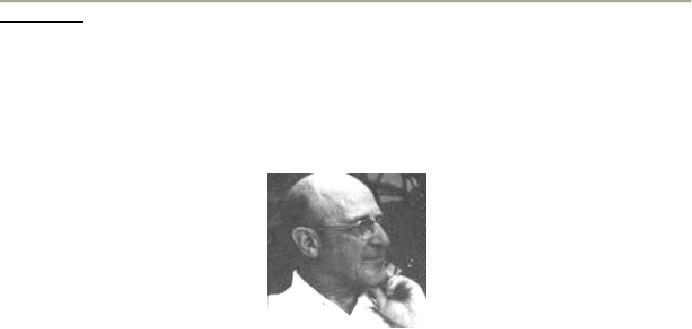 |
HUMANISTIC PSYCHOLOGY:Abraham Maslow, Carl Rogers, Positive Psychology |
| << ERIKSON and MORENO:J.L. Moreno, Protagonist, Audience, Role playing |
| MODERN TRENDS IN PSYCHOLOGICAL TREATMENT >> |

History
and Systems of Psychology
PSY502
VU
Lesson
37
HUMANISTIC
PSYCHOLOGY
Humanistic
psychology is a branch of psychology
that developed from behaviorism.
Humanistic
psychologists
thought that the behaviorists ignored the
humanistic view of people, their
needs, aspirations,
hopes,
fears, and focused only on
behavior. In other words, the
human and emotional element
was ignored
and
only the apparent behavioral patterns
were studied. They also
thought that psychoanalysts
put too
much
emphasis on unconscious motivations
and they neglect "humanity" of
man. Therefore, humanistic
psychologists
focused on such human
sentiments as joy, contentment, kindness,
ecstasy and
generosity.
Abraham
Maslow
Abraham
Maslow was born in 1908
and he died in 1970. He was
born in New York and he
did PhD in
1934
form Wisconsin University.
Maslow is famous for his
theory of motivation, called the
Hierarchy of
Needs.
Maslow's
primary contribution to psychology is his
Hierarchy of Human Needs.
Maslow contended that
humans
have a number of needs that
are instinctual, and are innate.
Maslow assumed our needs
are
arranged
in a hierarchy in terms of their potency.
Although all needs are
instinctive, some are
more
powerful
than others. The lower the
need is in hierarchy, the more powerful
it is. The higher the need is
in
hierarchy,
the weaker and more
distinctly human it is. The
lower, or basic, needs in the
hierarchy are similar
to
those possessed by non-human animals,
but only humans possess the
higher needs.
Those
needs or motives are:
i.
Physiological needs
At
the bottom of the hierarchy are
physiological needs, including the
biological requirements for
food,
water,
air, and sleep.
ii.
Safety needs
Once
the physiological needs are met, an
individual can concentrate on the
second level, the need for
safety
and
security. Here included the needs
for structure, order,
security, and
predictability.
iii.
Need for
belongingness
The
third level is the need for
love and belonging. Included
here are the needs for
friends and companions,
a
supportive family, identification
with a group, and an intimate
relationship.
iv.
Esteem Needs
The
fourth level is the esteem needs.
This group of needs requires
both recognition from other
people that
results
in feelings of prestige, acceptance,
status, and self-esteem that
results in feelings of
adequacy,
competence,
and confidence. Lack of satisfaction of
the esteem needs results in
discouragement and
feelings
of inferiority.
v.
Need for Self
Actualization
Finally,
self-actualization sits at the apex of
the original pyramid of needs. Self
actualization needs refer to
the
need of achieving one's true
potential.
83

History
and Systems of Psychology
PSY502
VU
Carl
Rogers
The
other prominent humanistic
psychologist was Carl Rogers
who was born near
Chicago, U.S.A., in 1902
and
died in 1987. His education
started from the second
grade, because he had
already read before
kindergarten.
He got his PhD in
educational psychology from
New York in 1931 and
worked at Ohio State
and
University of Chicago. He was
offered a full professorship at
Ohio State in 1940. In 1942,
he wrote his
first
book, Counseling and
Psychotherapy. Then, in 1945, he
was invited to set up a
counseling center at
the
University of Chicago. It was
while working there in 1951
that he published his major work,
Client-
Centered
Therapy, wherein he outlines his basic
theory.
Carl
Rogers (1902-1987)
In
1961 in his book entitled
"On Becoming a Person" he regarded
self actualization as the greatest drive
in
human
personality. He called it the highest level of
mental health. According to Carl
Rogers, a
psychologically
healthy person:
�
Has
openness to experience
�
Fully
lives the moment
�
Has
a sense of freedom
�
And
is highly creative
Based
upon his humanistic theory
and point of view he developed
his system of psychotherapy
called
Theory
of Client Centered Therapy. According to
this theory, the person has the
capacity to rid himself of
his
problems. Method of Client
Centered Therapy includes reflection in
affective terms.
Positive
Psychology
Humanistic
Psychology has given rise to a
subject called the Positive Psychology in
21st century. Positive
psychology
is the scientific study of human
happiness. The history of
psychology as a science shows
that the
field
has been primarily dedicated
to address mental illness rather than
mental wellness. Its
research
programs
and application models have
dealt mainly with how people
are wrong rather than how
they are
right.
The need to correct this
bias was anticipated in psychological
writings as early as those of the
American
psychologist and philosopher
William James. In his 1902
book, The
Varieties of Religious
Experience,
James
argues that happiness is a chief
concern of human life and
those who pursue it should be
regarded as
"healthy-minded."
Several humanistic psychologists--such as Abraham
Maslow, Carl Rogers, and
Erich
Fromm--developed
successful theories and
practices that involved
human happiness despite
there being a
lack
of solid empirical evidence behind their
work. However, it is the pioneering
research of Martin
Seligman,
Ed Diener, Mihaly Csikszentmihalyi,
Christopher Peterson, Don Clifton,
and many others
that
promise
to put the study of human
happiness onto a firm scientific
foundation and add some
positivity to
the
predominantly negative discipline of
psychology.
84
Table of Contents:
- INTRODUCTION:Methodology, Grading, Course Overview up to Midterm
- ANCIENT GREEK PHILOSOPHY/PSYCHOLOGY:Socrates, Plato
- GREEK THINKERS:Aristotle, Contiguity, Contrast
- PSYCHOLOGY IN THE 5TH TO 12TH CENTURY:Saint Augustine, Avicenna
- PSYCHOLOGY IN THE 5TH TO 12TH CENTURY:Al-Ghazali, Ibn-Rushd, Averroes
- RENAISSANCE:Rene Descartes
- ASSOCIATIONISTS:Thomas Hobbes, John Locke
- ASSOCIATIONISTS:David Hume, FRENCH REVOLUTION, Denis Diderot
- GERMAN CONTRIBUTION:Wilhelm Liebniz, Immanuel Kant, Friedrich Hegel
- INDUSTRIAL REVOLUTION:RUSSIAN CONTRIBUTIONS
- RUSSIAN CONTRIBUTIONS:Ivan Pavlov, Reflex, Acquisition
- RUSSIAN CONTRIBUTIONS:Vladimir Bekhterev
- IMPACT OF PHYSICAL SCIENCES ON PSYCHOLOGY:Charles Darwin, Gustav Fechner
- STRUCTURALIST SCHOOL OF PSYCHOLOGY:Wilhelm Wundt
- FUNCTIONALISM:William James, John Dewey
- EUROPEAN FUNCTIONALISTS:David Katz, Edgar Rubin, Jean Piaget
- BEHAVIORISM:Edward Lee Thorndike, Law of belongingness
- BEHAVIORISM:Albert Weiss, Edwin Holt, Learning, Canalization, Walter Hunter
- BEHAVIORISM:J.B.Watson
- NEO-BEHAVIOURISTS:Clark Hull, Edward Tolman, Edwin Gutherie
- NEO-BEHAVIORISTS:B.F. Skinner, Karl Lashley, Donald Hebb, Hobart Mowrer
- GESTALT PSYCHOLOGY:Max Wertheimer, Similarity, Proximity, Closure
- GESTALT PSYCHOLOGY:Wolfgang Kohler, Kurt Koffka, Edward De Bono
- GESTALT SCHOOL AND DYNAMIC PSYCHOLOGY:Kurt Lewin, DYNAMIC PSYCHOLOGY
- HISTORICO-EVOLUTIONARY PSYCHOLOGY:Leon Vygotsky, Sergei Rubenstein
- HISTORICO-EVOLUTIONARY PSYCHOLOGY:Alexei Leontiev, K.M Bykov
- SCIENTIFIC LOOK AT MENTAL DISORDERS
- SCIENTIFIC LOOK AT MENTAL ILLNESS:Philippe Pinel, Sameul Tuke
- SIGMUND FREUD AND THE PSYCHOANALYTIC MOVEMENT:The Superego
- SIGMUND FREUD AND PSYCHOANALYTICAL MOVEMENT:Anna Freud
- CARL JUNG AND ANALYTICAL PSYCHOLOGY:Carl Gustav Jung
- JUNG’S ANALYTICAL PSYCHOLOGY:Carl Gustav Jung
- ALFRED ADLER AND INDIVIDUAL PSYCHOLOGY:Alfred Adler
- NEO-FREUDIANS:Harry Stack Sullivan, Karen Horney
- NEO-FREUDIANS:Karen Horney, Erich Fromm
- ERIKSON and MORENO:J.L. Moreno, Protagonist, Audience, Role playing
- HUMANISTIC PSYCHOLOGY:Abraham Maslow, Carl Rogers, Positive Psychology
- MODERN TRENDS IN PSYCHOLOGICAL TREATMENT
- MODERN TRENDS IN PSYCHOLOGICAL TREATMENT:Biological Approaches
- ANTI-PSYCHIATRY MOVEMENT:D.L. Rosenhan, R.D. Laing, Aaron Esterson
- PSYCHOLOGY IN THE THIRD WORLD:Frantz Fanon
- PSYCHOLOGY IN THE THIRD WORLD CHINA AND PAKISTAN
- PSYCHOLOGY IN THE 21st CENTURY
- PSYCHOLOGY IN THE 21ST CENTURY:Consumer Psychology
- PSYCHOLOGY IN THE 21ST CENTURY:Sports Psychology, Positive Psychology